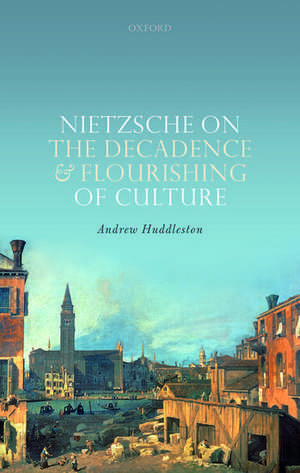Nietzsche on the Decadence and Flourishing of Culture
Autor Andrew Huddlestonen Limba Engleză Hardback – 2 mai 2019
Preț: 459.02 lei
Preț vechi: 594.04 lei
-23% Nou
Puncte Express: 689
Preț estimativ în valută:
87.83€ • 91.95$ • 72.68£
87.83€ • 91.95$ • 72.68£
Carte tipărită la comandă
Livrare economică 26 martie-01 aprilie
Preluare comenzi: 021 569.72.76
Specificații
ISBN-13: 9780198823674
ISBN-10: 0198823673
Pagini: 206
Dimensiuni: 141 x 222 x 17 mm
Greutate: 0.36 kg
Editura: OUP OXFORD
Colecția OUP Oxford
Locul publicării:Oxford, United Kingdom
ISBN-10: 0198823673
Pagini: 206
Dimensiuni: 141 x 222 x 17 mm
Greutate: 0.36 kg
Editura: OUP OXFORD
Colecția OUP Oxford
Locul publicării:Oxford, United Kingdom
Recenzii
Andrew Huddleston's Nietzsche on the Decadence and Flourishing of Culture is an impressive book: It is sophisticated, yet light-footed and elegant. It is historically ambitious, yet systematically rich. From beginning to end, it is an enjoyable read.
The so-called 'continental' side of Nietzsche reception is already very at home with the idea of a 'philosophy of culture', of distinctive modes of cultural hermeneutics, and of Nietzsche as a practitioner and forerunner of such. It is high time that those of us on the more 'analytic' side of things began to explore this side of Nietzsche's work in more depth. Huddleston's book is a rich and promising first move in this direction.
I learned a lot from this volume and I commend it to other Nietzsche scholars, especially those thinking about the role of 'culture' in his thought.
There is a lot to admire in this book. Huddleston's style is at once breezy and precise, staking out its territory pragmatically, robustly, yet without aggression. He combines minute textual analysis with broad-sweeping gestures toward Nietzsche's place in intellectual history, while never losing sight of major critical currents. Most of all, he is careful with his claims, drawing subtle distinctions that will make him harder to misunderstand and that will provoke and further the critical commentary... One of the main messages here—that Nietzsche, as cultural critic, has been ignored for too long—is well taken. For any Anglophone philosophical scholar wishing to write on Nietzsche and culture, this book will—I predict—soon become the first place to look.
The author pays a great service to a more balanced general comprehension and assessment of Nietzsche...
The so-called 'continental' side of Nietzsche reception is already very at home with the idea of a 'philosophy of culture', of distinctive modes of cultural hermeneutics, and of Nietzsche as a practitioner and forerunner of such. It is high time that those of us on the more 'analytic' side of things began to explore this side of Nietzsche's work in more depth. Huddleston's book is a rich and promising first move in this direction.
I learned a lot from this volume and I commend it to other Nietzsche scholars, especially those thinking about the role of 'culture' in his thought.
There is a lot to admire in this book. Huddleston's style is at once breezy and precise, staking out its territory pragmatically, robustly, yet without aggression. He combines minute textual analysis with broad-sweeping gestures toward Nietzsche's place in intellectual history, while never losing sight of major critical currents. Most of all, he is careful with his claims, drawing subtle distinctions that will make him harder to misunderstand and that will provoke and further the critical commentary... One of the main messages here—that Nietzsche, as cultural critic, has been ignored for too long—is well taken. For any Anglophone philosophical scholar wishing to write on Nietzsche and culture, this book will—I predict—soon become the first place to look.
The author pays a great service to a more balanced general comprehension and assessment of Nietzsche...
Notă biografică
Andrew Huddleston is Senior Lecturer in Philosophy at Birkbeck, University of London. He studied as an undergraduate at Brown University and at Pembroke College, Cambridge. He completed his PhD at Princeton University under the supervision of Alexander Nehamas. Prior to coming to Birkbeck, he was a Fellow of Exeter College, Oxford.
